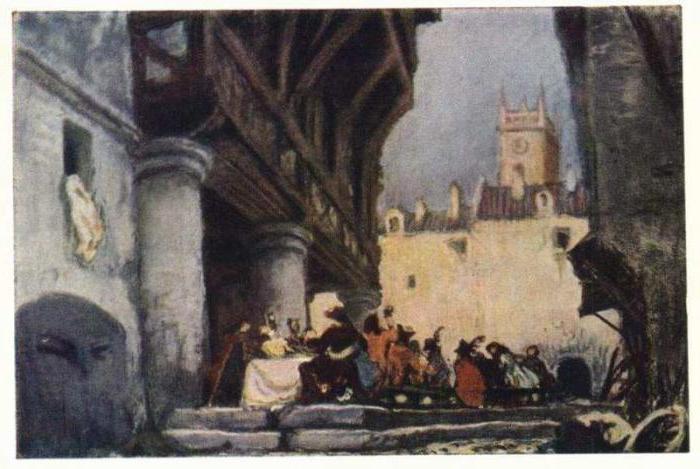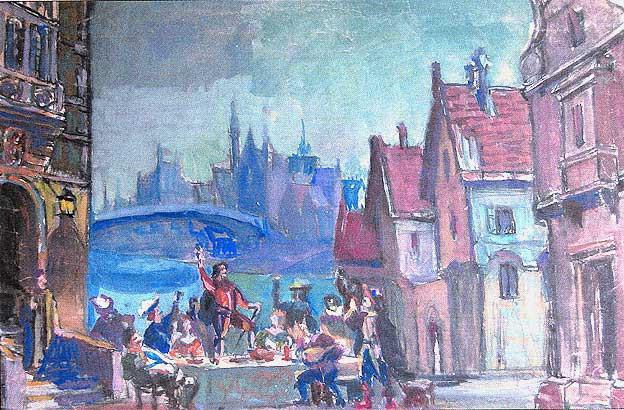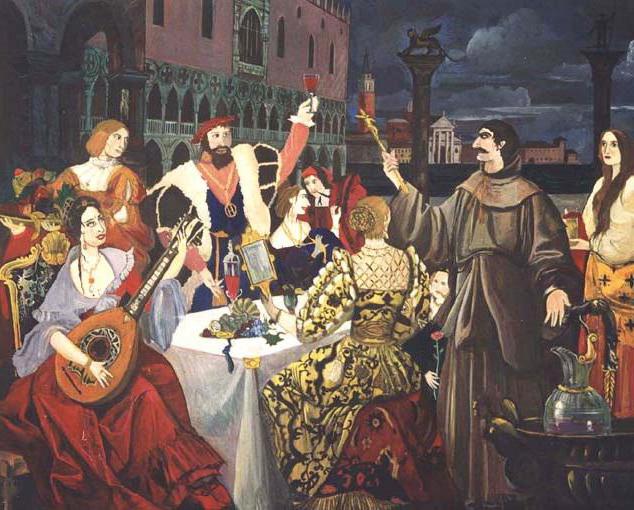In the Middle Ages and later, people were terrified of the plague epidemics that hit cities and countries, because there was only one way to escape: to run fast, far and for long. Only religion, its rites and faith could help those remaining overcome the fear of death. This is a description of the relationship to the "pestilence", its summary. No one dared to arrange a feast during the plague.
But numerous images of the "Triumph of Death" appeared.
Boldino autumn
Before the marriage of his son, his father gave him the village of Kistenovo, and the poet went to inherit. Kistenovo is a village near Boldino. He counted on only a month, and was delayed by three due to the cholera epidemic that had begun in Moscow. Pushkin called it the plague for himself.
You can’t get to Moscow - there are quarantines around. The poet is fruitfully working, but he is consumed with anxiety for the relatives and friends who remained in the "plagued" Moscow. Under such circumstances, the poet makes an
interlinear translation for himself from the English “Cities of the Plague”, dedicated to the plague that raged in London in 1666 and, reinterpreting its contents, writes his original composition “Feast during the Plague”, a summary of which will now be outlined.
Outside. At the table
In plagued places, only madmen remained. Their meeting on the street at the table is described by Pushkin. The company of young people raises glasses in memory of the cheerful Jaxon, who two days ago enlivened the general conversation with jokes and witticisms. Now his chair is empty - he was not spared by the plague. The chairman invites Mary to sing something sad. She sings a mournful song about places once blooming, where now there are only cemeteries. They do not empty and are constantly replenished. And if the death of the singing is destined, she asks her beloved in the distance to take her on the last journey and leave these places until they are infected. And only then visit the ashes of the deceased girl.

The Chairperson expresses her gratitude to Mary for the song about her hometown, which the plague once visited and where mournful moans were heard. Louise enters the conversation. She is against tearful songs. But at this time, a wagon loaded with deceased rides past them. Louise falls into oblivion. Mary brings her to her senses, and Louise complains that it seemed to her that the dead were calling her after them. Then they explain to Louise that these carts with the dead have the right to drive everywhere, and they ask Chairman Walsingham to sing a riotous song, which should appear above the boiling bowl. This is the beginning of the story that Pushkin tells, its summary. The feast continues during the plague.
Walsingham's Song
For the first time in his life, the Chairman turned to poetry and created the hymn to the Plague. In a hoarse voice, he sings with inspiration.

The lines of this hymn in Russia are snapped up for quotes. Many do not even know where they get these statements from. We know Pushkin without reading, but it would be nice to read and think. But its essence is as follows. When the cold Winter comes, everyone hides in warm houses with lighted fireplaces and have fun at the hot feasts. And now the formidable Queen - the Plague is knocking on all the windows. How to escape from her? Yes, just like from Winter, to lock yourself up, light fires, pour glasses and start to feast, arranging balls. In battle and on the edge of a gloomy abyss there is an inexplicable rapture. So when meeting with the Plague, which threatens with death and death, there is a strange pleasure - with a sinking heart to see who gets over it. And therefore we praise the Plague - we are not afraid of the darkness of the grave and together we fill our glasses and feast. Courage mixed with fear that must be overcome is the meaning of Walsingham's song, its summary. A feast during the plague is a courageous and desperate confrontation irresistibly beating all living plague.
The appearance of a priest
The priest immediately, without preludes and introductions, begins with the curses of the people sitting at the table. He says that they are atheists and their songs are mockery, debauchery and mockery of death and the sorrow of a funeral. “I hate,” he continues, “your enthusiasm. The earth is shaking from your chants over the graves of the deceased. They do not allow old men and women to cry over the buried. Demons have settled in you, not otherwise, and drag you to themselves.” Such is the sincere sermon of the priest of a company of young people, its summary. A feast during the plague is sacrilege that defies either understanding or description. But the youth is not at all embarrassed. They offer only him to leave. But the priest dispersed, as in a pulpit, he could not be stopped. He continues. He begs, recalling the shed blood of Christ, to go home to everyone, ending this ugly feast. The Chairperson objects to him. He says that everyone’s houses have sorrow and grief, and youth needs joy.

The priest, looking at the speaker, asks: “Is it really you, Walsingham, you who wept over the corpse of your mother and could not tear yourself away from her grave? Do you think that she doesn’t see all this from heaven and doesn’t cry because you don’t want to hear holy words? ” But Walsingham objects bitterly. He describes his despair at the sight of an empty house. “Only,” he says, “the full bowl drowns out and dulls the consciousness of loneliness. Let my behavior be lawless, but I remain at the banquet and curse the one who leaves here. And you, old man, leave, you have no place here.” But the priest tries to poison his mental wounds, recalling his beloved but dead wife. This is how Pushkin feast describes during the plague. The summary boils down to overcoming the fear of death in three ways. The first is prayer and humility, the second is oblivion, and the third is Walsingham's song as the invincibility of the human spirit in the form of terrible trials of fate.
conclusions
Walsingham's position is closest to Pushkin. Walsingham, listening to the priest, hesitates at some point, especially when he was reminded of his wife, whom he loved immeasurably. But she was swept away by the hateful plague. Walsingham remains. Pushkin gives a remark concluding the story: the chairman was deeply lost in thought. This is the summary of the story “Feast during the Plague” by A. S. Pushkin.